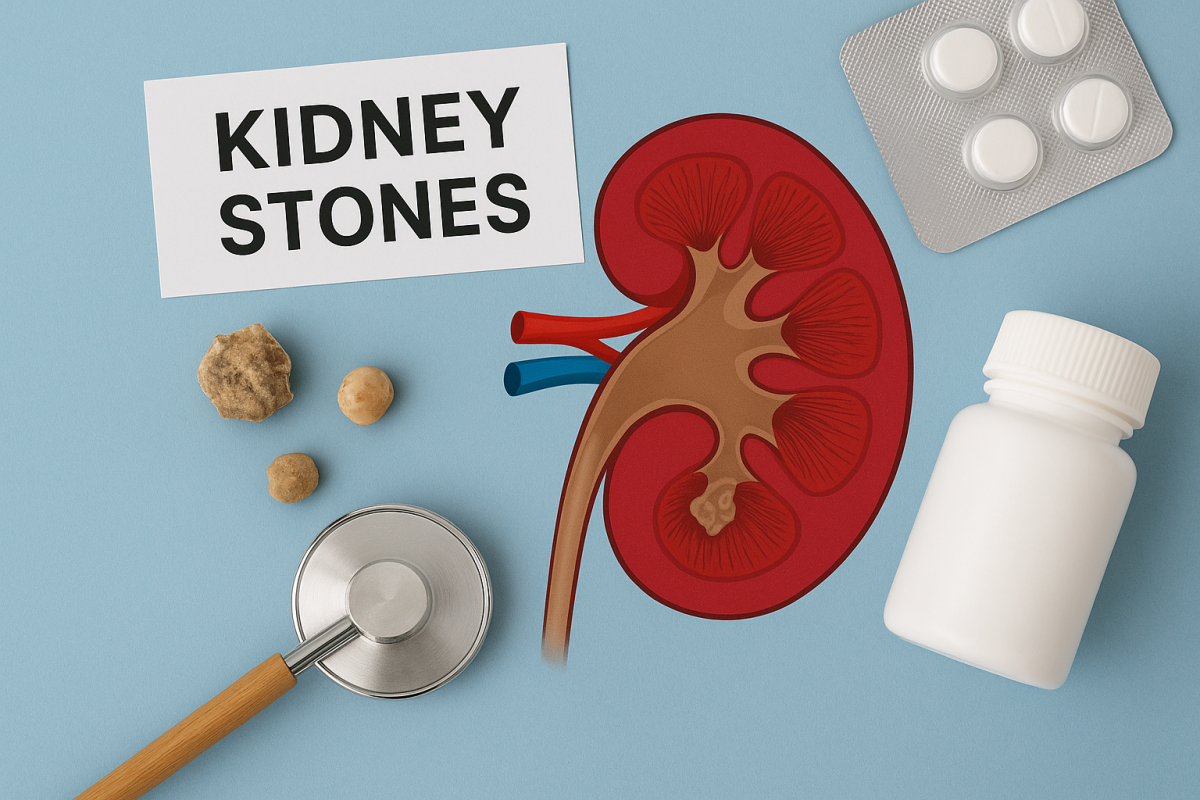No products in the cart.
HEALTH BLOGS BY FITBYNET, Uncategorized
Kidney Stones: Cause, Symptoms, Medication & Treatment
Kidney stones are solid masses that form in the kidneys when minerals and salts crystallize. They can vary in size and cause intense pain when moving through the urinary tract. Kidney stone affect millions of people worldwide and can lead to serious health issues if not managed properly.
Causes of Kidney Stones
The imbalance of substances in the urine due to dehydration, diet, and other medical conditions causes most kidney stones. Risk factors include a high intake Of calcium, obesity, and previous infections of the urinary tract. Dehydration is the leading cause of kidney stones as it concentrates urine, enhancing the formation of stones.
Symptoms of Kidney Stones
Kidney stone may not cause any symptoms until they begin to move within the kidney or pass into the ureter, which is the tube connecting the kidney to the bladder. Common symptoms of kidney stones include:
- Severe pain in the side, back, or lower abdomen, is often described as one of the most intense pains a person can experience.
- Blood in the urine may turn the urine pink, red, or brown.
- Painful urination or inability to pass urine.
- Nausea and vomiting.
- Frequent urination or an urge to urinate.
- Cloudy or foul-smelling urine.
Medications for Kidney Stones
Several medications can help manage kidney stone. Over-the-counter pain relievers like ibuprofen can help alleviate pain. Oxalo Capsule, containing probiotics like Oxalobacter formigenes, can reduce urinary oxalate excretion by 24-40%, preventing the formation of calcium oxalate stones. It helps reduce the risk of recurrent kidney stones and supports overall kidney health. Oxalo Forte Capsule, another probiotic blend, also helps maintain intestinal health, prevents stone formation, and aids digestion.
Treatment for Kidney Stones
Apart from medicines, there are several treatment options according to the size and severity of the kidney stone:
- Conservative Treatment: The small stones are mainly treated with fluid intake to flush out the system. Pain relievers can also be used in case of heavy pain during this process.
- Shockwave Lithotripsy: This is a non-invasive treatment that breaks kidney stones into smaller pieces using sound waves, which then can easily pass through the urinary tract.
- Ureteroscopy: In this procedure, a small tube is inserted through the urethra to remove or break up the stone.
- Percutaneous Nephrolithotomy: This is a surgical procedure that is used for larger stones, which cannot be treated with less invasive methods. It involves removing the stone through a small incision in the back.
- Surgery: In rare cases, when stones are too large or complicated to pass, surgery may be necessary to remove them.
FAQ’s
Question 1:- Can a Child Get Kidney Stones?
Answer:- Yes, although much less frequently, anyone can get kidney stones due to dehydration, obesity, or conditions like hypercalciuria.
Question 2:- My Stone Hasn’t Gone Away. Do I Need Surgery?
Answer:- No, not if you do shockwave lithotripsy or ureteroscopy. Usually, the last resort.
Question 3:- What Would Happen if I Continued to Develop Stones?
Answer:- Recurring stones can cause damage to the kidneys or chronic kidney disease. Knowing the cause and continuing prevention is the best way to avoid it.
Kidney stones are painful but can be managed with proper treatment. Probiotics like Oxalo Capsule and Oxalo Forte Capsule may prevent stone formation in the kidneys and help in maintaining kidney health. Proper hydration, balanced dieting, and consulting a doctor about it are a sure way not to develop kidney stones.

